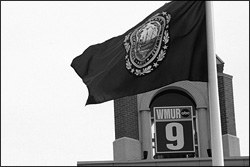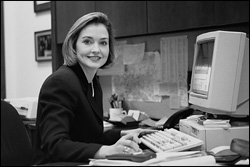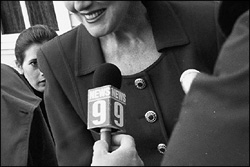


|
Interview with Karen Brown, news director at WMUR-TV Channel 9 |
| A look at New Hampshire
news organizations...
WMUR-TV ABC Channel 9 Copyright 1999 Eric M. Appleman/Democracy in Action. |
WMUR-TV
Primary Coverage Back |
| Interview with Karen Brown, news director at
WMUR-TV Channel 9
Our objective: "To be the most comprehensive, the most accurate, the most objective outlet for infomration about campaign 2000..." [transcript below] Background
To bring focus to the station's coverage this time around, WMUR has formed a Team 2000 Political Unit, headed by news director Karen Brown and co-anchor Tom Griffith. (Carl Cameron, WMUR-TV's ubiquitous political reporter in the 1996 primary campaign, has moved on to the national stage, and is now at Fox News). In addition to its regular news coverage of the candidates' activities, WMUR-TV will produce special programming throughout the year. "The New Hampshire Citizens' Forum," a series of 30-minute programs featuring presidential candidates, is airing weekly starting on March 27, 1999. At the close of the campaign, during the week prior to the primary, WMUR proposes to co-sponsor, along with CNN, two nationally televised debates. WMUR-TV first went on air in 1954, and it became an ABC affiliate four years later in 1958. In 1981 the Imes Communications Group acquired WMUR, and the station's influence has increased markedly since then. In December 1995 WMUR broadcast its first newscast from the new studio. Some wags joked that complex had been paid for single-handedly by Steve Forbes, courtesy of his intense ad campaign in the lead-up to the 1996 primary. Indeed, in the closing months of the primary, WMUR's newscasts not only provide a front row seat for news on the campaign, they also fully immerse viewers in the candidates' advertising. |
 |
 |
|
 |
| Interview
Karen Brown, news director at WMUR-TV, spoke with DEMOCRACY IN ACTION in her office on February 9, 1999. Brown has been with the station for 14 years and became news director in April 1996. She also co-anchors the 6 o'clock newscast and heads up the political unit. |
|
|
What are your objectives and goals for covering the 2000 primary? KAREN BROWN:
To be the most comprehensive, the most accurate, the most objective outlet
for information about campaign 2000. We want to do it better than anybody
else.
|
||
|
What resources will you be putting into that effort? KAREN BROWN:
We formed a Team 2000 political unit and we announced the formation of
that last summer, late in the summer, I believe it was July [July 10, 1998].
Since then we've held regular meetings of the unit to look at issues, to
look at candidates, to discuss the kinds of things we wanted to do--polling,
the web site, day in, day out coverage. We are currently programming 35
hours of news weekly. That gives us a lot of opportunities and a lot of
different dayparts to cover campaign 2000.
|
||
|
Would there be different types of things you would want to do for the different audiences? KAREN BROWN: First and foremost, one of the things we like to do, and have done in the past and continue to do now, is, whenever possible, to get the candidates or likely candidates to join us live in studio. Why? Because I think that one of the most effective ways voters can get to know the candidates is to see and hear them. And what better way to do that than to hear from them in an interview format that can run anywhere from 3 to 6 minutes live on set. But there are a number of other different projects that we're working on as well. We just aired last week, in conjunction with CNN, a one-hour special called "First in the Nation," where we profiled all of the leading candidates based upon some polling that we had done, again in conjunction with CNN. So that was really your first look at some of the candidates in a comprehensive way. George W. Bush--it was a really good interview with him. You actually sent someone down there? KAREN BROWN: We sent someone [Steve Cooper] to Austin, and sat down with him and asked him the questions that people have been wanting to ask him. He's a very artful, clever politician, but it was… Obviously he didn't do anything dramatic like declare his intentions to run, but you got a sense as to he's a very different person than his father. He's a lot more energetic. He has some definite ideas about policy areas that he wants to focus on and is focusing on Texas. And you can bet that if he chooses to run, they'll be themes carried to a presidential campaign. When did that special air? February 2nd.
|
TOP | |
|
And you did that special in partnership with CNN? We worked with CNN in 1996 and we're working with them again in '99 and 2000. And there are some other events that will be coming down the calendar which we'll be announcing shortly. WMUR is an ABC affiliate. Is there a conflict? KAREN BROWN: No, not at all. We're an ABC affiliate and we're a CNN affiliate and we're a Fox affiliate, which is great because we have a lot of resources to work with. It's a two-way relationship. By virtue of our being a statewide television station, they look to us for the pulse, if you will, as to what's going on here in New Hampshire. So it benefits them as well. [Ed. Note: As another example of the benefits of this relationship, in the closing days of the 1996 primary campaign, ABC News broadcast out of one of WMUR's two studios. This was not only convenient for ABC, but it allowed WMUR the opportunity to interview ABC talent during some of its programming]. How does your polling arrangement work? KAREN BROWN: We are currently using RKM Research out of Portsmouth. Kelly Meyers (SP?) was the head over at the UNH Survey Center, left to form his own company and we stayed with Kelly, and we've used him for a couple of years now. Is it too early to start thinking about the first debates? KAREN BROWN:
No, not at all. We have been working on those for some time. So we've got
a couple of different projects that we'll be announcing by the end of the
month, of February.
|
TOP | |
|
You have a very new, up-to-date modern facility here. Are there any changes this cycle as to how you're going to cover things, or lessons you learned in '96 that you want to do differently? KAREN BROWN: Our team is larger, so we're able to devote more resources in terms of cameras and in terms of producers and in terms of reporters and anchors covering the candidates. So we've grown our staff. And we created the political unit, which is brand new; we never had that before. I think one of the biggest changes for us technology-wise is the advent of digital television. We were one of the first 24 television stations in the country to begin broadcasting in digital and are now. And we are looking at ways, have not made any firm decisions, but clearly looking at how digital will impact our coverage of campaign 2000. And that's an area where the political unit will actually work in conjunction with our engineering and programming staff to determine that. That's all very abstract… KAREN BROWN: Well it is abstract. I mean it's so new. Literally we began broadcasting our digital signal alongside our analog signal, which is the signal that's been out there forever, just in November [1998]. As you know, not too many people yet have digital televisions in their home. Ultimately there will be decisions made about multicasting--how you divide that stream--and we will look at how to program those various streams. And so that is a work in progress. I wish I could offer you more specifics; they're not there yet. So that may not happen this time around? KAREN BROWN:
Well, no. We're looking at how we can maximize our digital transmission
for campaign 2000, but that involves more departments than just this news
department; it involves programming and engineering, so it's a bigger animal
than I can wrestle.
|
TOP | |
|
Can you describe the political unit? KAREN BROWN:
There are six on-air reporter/anchors [Karen Brown, Tom Griffith , Steve
Cooper, Scott Spradling, Jennifer Crompton, and Jennifer Vaughn]and one
producer [Alisha MacLean]. I should state at the outset that everybody
here covers politics. But we created this political unit to help us focus
on issues, to craft the direction that we wanted this news department to
go in. So it's a unit that gives guidance to the rest of the news team.
We've made decisions about polling, about special presentations like the
one that aired last week, we're working on our web site… So it's a unit
that's really focused on politics, but we all end up covering politics
here.
|
TOP | |
|
Are there any "dream projects" that you'd like to do if you had unlimited resources? KAREN BROWN:
Well I think that the way we're approaching it this time, we're doing it
in a more comprehensive way. Last time, as you noted, we had a presidential
[primary] debate here in our studio. We'll be doing that again. But the
process, it never really ended after '96. I mean you had Lamar [Alexander]
here practically the next day and Steve Forbes and others. We're looking
at just doing more comprehensive coverage. Everything I've wanted to do
is happening.
|
TOP | |
|
Do you have any insights on the political terrain in New Hampshire? KAREN BROWN:
People vote with their pocketbooks; that's always been the case up here.
I think that what's happened in Washington with regard to Ken Starr's investigation
will have an impact on the way people vote. I think that everybody is waiting
for this impeachment trial to end and then they're really going to start
looking at what they want in a president. I believe George Will and others,
that there'll be some sort of cleansing, if you will, that people are just
looking for a president that they can respect and honor and admire. Yes
they have to feel good about job security and their pocketbook and their
wallets, but they also have to feel good about a president whose values
they can respect, and I think that that really will be a factor in this
next election.
|
TOP | |
|
What does it take for a presidential candidate to do well in New Hampshire? KAREN BROWN: Well it takes a lot of things. You have to spend time here. You definitely have to have good grassroots organization and you have to meet the people. It is all about the coffees in the homes and meeting and greeting at the restaurants. They're great photo ops, but that's really a chance for these candidates to touch base with the New Hampshire voter. It's not just about television interviews and political ads; you have to conduct a good grassroots campaign. In addition to spending time here, you have to have a message. You can't just be out there and not have an idea and not have a vision. You have to be able to articulate your vision and it has to resonate with the New Hampshire voter. We're Yankees; there's a strong libertarian streak here. And so I think that the person who comes out the winner in both the Republican and the Democratic presidential primaries here will be the man or woman who has a vision, articulates it well, and connects with the New Hampshire voter. The other key thread woven into this whole campaign 2000 fabric is the health of New Hampshire's presidential primary. And there is serious concern on the part of whether this state will be able to retain its first [-in-the-nation primary] status. And there's a concerted effort, bipartisan effort on the part of our secretary of state and our governor and Republicans to see that New Hampshire keeps its status as first in the nation. A lot of the candidates are being asked will they take steps to protect New Hampshire's first status. The pledge? KAREN BROWN:
The pledge. And that is, I believe, going to also have an impact on the
way New Hampshire voters decide. Is it going to be the primary reason somebody
votes for a candidate? No But I think that a lot of people will be hard-pressed
to vote for someone that doesn't support New Hampshire's first status.
It's all woven into that fabric.
|
TOP | |
|
You've talked with Vice President Gore a number of times; how many interviews have you done with him already? I've lost track.
Four or five. And the last time I spoke with Elizabeth Dole was about a
year ago. I'm looking forward to when she makes some decisions to sitting
down with her again. That's one of the great things about being a journalist
in New Hampshire. Literally by the time February 2000 comes around I will
likely have had a chance to meet and talk with every single presidential
candidate, as will most of the people on my staff. That's why it's such
a great place to live and work.
|
TOP | |
|
Sneak preview: special programming. KAREN BROWN: …a series of forums that we actually began taping yesterday. We'll do ten half-hour programs profiling the candidates and likely candidates, and that series will begin airing in April. The half hour consists of a one-on-one interview with the candidates as well as question-and-answer with an in-studio audience made up of New Hampshire voters. It's a public service that we are offering [with] Citizens Bank of New Hampshire… We taped the first one yesterday with Gary Bauer. We pick 36 people that represent a cross section of different groups--religion, education, business, kids voting--and we invite them in, obviously pending their schedules. And the questions were interesting yesterday, and we expect that the remainder of the forums will be just as interesting and engaging. It's interesting to hear what's on the voters' minds. We have a set that we've constructed specifically. They're called the New Hampshire Citizens Forum… We constructed a special set so that it's very intimate: The moderator, who is a member of the Team 2000 Political Unit, the featured guest--candidate or likely candidate--and then this audience, which is kind of curved around. So it's a great way to hear from these candidates, get to know them and interact with them. It's really an
interesting dynamic. The audience actually comes with some very pertinent
and pointed questions, but the moderator also is there to make sure it
doesn't go astray, and to follow up when needed. Sometimes somebody won't
answer the question that was asked and you have to bring them back around…
|
TOP | |
|
How do you put these things up on your web site? KAREN BROWN: We are currently streaming some of our newscasts already on the site, and we'll be talking with our webmaster about whether this series will be streamed to the political portion. Again that's one of the things, as we construct this portion of the web site, we're having meetings at this point definitely weekly and sometimes more often as issues come up. So stay tuned.
|
TOP | |
| Copyright 1999 Eric M. Appleman/Democracy in Action |